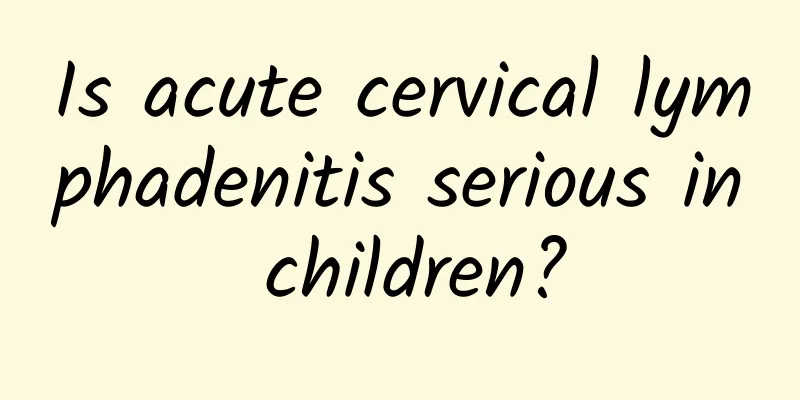Is acute cervical lymphadenitis serious in children?

|
Whether acute cervical lymphadenitis in children is serious depends on the severity of the disease, but it is usually not a life-threatening disease. If a child has a persistent high fever, rapid enlargement of lymph nodes with pain, redness and swelling of the skin, or limited movement, he or she should seek medical attention as soon as possible because there may be a risk of suppuration or bacterial spread. Acute cervical lymphadenitis is usually caused by bacterial or viral infections, such as upper respiratory tract infections, tonsillitis, etc., which cause swollen and painful lymph nodes in the neck. The initial symptoms may be mild lumps on one or both sides of the neck, accompanied by tenderness, which is a normal response of the body's immune system to infection. If the infection is severe, suppurative lymphadenitis may occur, manifested by high fever, abnormal local redness and swelling, or abscess formation. Common causes of the disease include children's underdeveloped immune systems, repeated infections, or direct trauma leading to bacterial invasion. Common pathogens include staphylococci, streptococci, or viruses (such as Epstein-Barr virus). To treat acute cervical lymphadenitis, mild cases can be treated with observation and symptomatic care, such as drinking plenty of water, ensuring adequate rest, and using symptomatic antipyretics as recommended by the doctor. If caused by bacterial infection, antibiotics are often required, such as amoxicillin clavulanate potassium, cephalosporins, or penicillins. In severe suppuration, local puncture or surgical drainage may be required. At the same time, parents should avoid squeezing their children's swollen lymph nodes to prevent the spread of infection or damage to tissues. The key to preventing acute cervical lymphadenitis in children is to enhance immunity and avoid sources of infection, such as teaching children to wash their hands frequently and avoid close contact with sick people. A balanced diet, appropriate increase in outdoor activities and improved living environment (such as keeping indoor air circulation) can also help reduce the occurrence of infection; if a child is found to have recurrent swollen lymph nodes or abnormal symptoms in the neck, be sure to take the child to a pediatrician for a clear diagnosis and treatment. |
<<: What is the cause of the right ovarian cyst? What should women do?
>>: Vaginitis Vaginal skin turns white
Recommend
Can I take fluconazole if my vaginitis relapses two days after I got the HPV 9-valent vaccine?
If vaginitis recurs two days after receiving the ...
Can habitual miscarriage lead to infertility? What is habitual miscarriage?
In the early stage of habitual miscarriage, only ...
Introduce specific preventive measures for female adnexitis
Adnexitis troubles many women and affects their n...
Drink lotus leaf oolong tea for hyperlipidemia
Older people are most afraid of the three high pr...
What are the causes of adnexitis?
If the disease of adnexitis is not treated in tim...
Causes of infection after abortion
A variety of complications may occur during and a...
What is the cause of second-degree cervical erosion in women? Second-degree cervical erosion is caused by 5 reasons
The cervix is a unique part of a woman's bo...
How to treat pelvic effusion 50mm
How to treat pelvic effusion 50mm? Pelvic effusio...
Calcium tablets replace milk? Expert: The key lies in the absorption rate
Last year, the Taipei City Government launched a ...
Experts explain the causes of recurrence of cervical hypertrophy
Among gynecological diseases, the recurrence rate...
What are the benefits of regular B-ultrasound examinations for irregular menstruation?
Generally, when checking for irregular menstruati...
Can poor sexual life also lead to uterine fibroids? There are three ways to treat fibroids
Uterine fibroids have become a common gynecologic...
Can I go to the hospital alone to have a painless abortion?
It is technically possible to go to the hospital ...
What are the symptoms of adnexitis?
Among the many symptoms of adnexitis, there are t...
What are the dangers of improper medical abortion?
Women of childbearing age have been praying for a...









